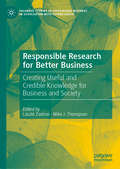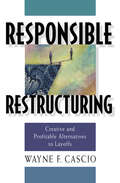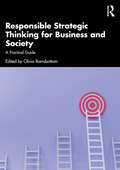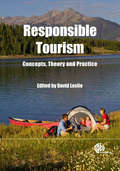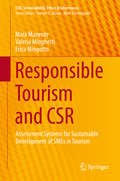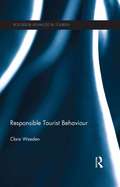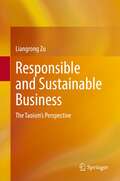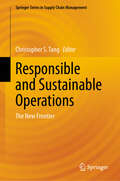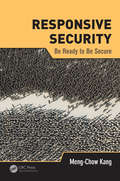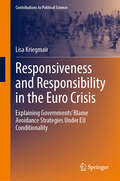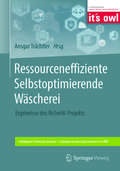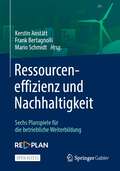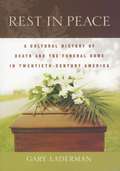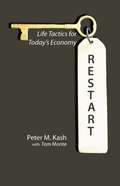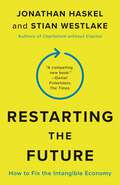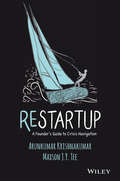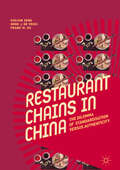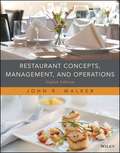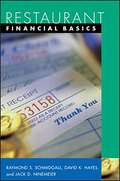- Table View
- List View
Responsible Research for Better Business: Creating Useful and Credible Knowledge for Business and Society (Palgrave Studies in Sustainable Business In Association with Future Earth)
by László Zsolnai Mike J. ThompsonThis book gathers original, empirical and conceptual papers that address the complex challenges of conducting responsible research in the business and management professions. It includes contributions related to, and reflecting on, the vision of the Responsible Research in Business and Management (RRBM) network, which proposes that business can help provide a better world if it is informed by responsible research. The responsible research agenda requires new methods of scholarly assessment that include criteria for measuring impact, systemic solutions and practitioner relevance. Theories greatly influence business and management practices, and as the late Sumantra Ghoshal warned, bad management theories are destroying good management practices. The authors of this book believe that good management theories can help to create new and better business practices.
Responsible Restructuring: Creative and Profitable Alternatives to Layoffs
by Wayne F CascioFirms that restructure through downsizing are not more profitable than those that don't, and often end up hurting themselves in the long run. Responsible Restructuring draws on the results of an eighteen-year study of S&P 500 firms to prove that it makes good business sense to restructure responsibly-to avoid downsizing and instead regard employees as assets to be developed rather than costs to be cut. Wayne Cascio explodes thirteen common myths about downsizing, detailing its negative impact on profitability, productivity, quality, and on the morale, commitment, and even health of survivors. He uses real-life examples to illustrate successful approaches to responsible restructuring used by companies such as Charles Schwab, Compaq, Cisco, Motorola, Reflexite, and Southwest Airlines. And he offers specific, step-by-step advice on what to do-and what not to do-when developing and implementing a restructuring strategy that, unlike layoffs, leaves the organization stronger and better able to face the challenges ahead.
Responsible Strategic Thinking for Business and Society: A Practical Guide
by Olivia RamsbottomThis exciting new text investigates the true essence of strategic thinking, and explores the need for alternative, responsible approaches in a complex global environment. Existing definitions of strategy and strategic management and leadership are examined, challenging previous ways of thinking that no longer relate to the way private, public and third sector organisations operate. Enriched by a diverse and experienced panel of contributors, chapters characterise the global systems which influence strategic thinking by spanning themes of politics, economics, society, technology, the legal framework, leveraging Generation Z’s values, environmental sustainability, and ethics. Supported by detailed global case studies from well-known and smaller brands, examples show how business and organisation leaders have thought differently to bring about change. The work concludes by providing a ‘systemic view toolkit’, which shows what can be done to optimise strategic thinking for change and longevity. To aid comprehension, each chapter includes a clear outline and Key Points, as well as a summary.Written in an accessible style, this title is intended as introductory and recommended reading for advanced undergraduate and postgraduate students of Strategic Management and Leadership, who are interested in how strategic thinking relates to the global political, economic and social environment.Online supplementary resources include PowerPoint slides, as well as recommendations for further reading within each chapter.
Responsible Tourism
by David Leslie Ralf C Buckley Professor Richard W Butler Dallen J Timothy Anita PleumaromTourism is one of the world's biggest industries. Responsible tourism is concerned with the effects of tourism on people, ecology, and communities, and seeks to ameliorate these impacts by providing tourism which benefits host communities, improves working conditions, involves the local community, promotes cultural heritage, and benefits the environment. This book discusses responsible tourism as a whole, including the politics, policy and planning behind it, and major sub-topics such as poverty reduction, the environment, transport, governance, wildlife tours and heritage.
Responsible Tourism and CSR
by Mara Manente Valeria Minghetti Erica MingottoWhat are Responsible Tourism and Corporate Social Responsibility? What is the industry's awareness regarding these concepts? What are the systems and tools currently available on the market that tourism SMEs can use to assess their engagement and the sustainability of their business? This book is aimed at replying to these questions and offering an innovative contribution to the current debate in the field. After having defined Responsible Tourism and CSR and the environment in which these methodologies develop, the authors present and compare the main European assessment and certification systems, describe their characteristics and functionalities and discuss the relevant issues concerning their application. Through the AHP model and the selection of a number of relevant case histories, the suitability and efficacy of these systems in monitoring the level of responsibility of tourism SMEs are analyzed and debated. The results obtained contribute to enhance the recognition and diffusion of CSR principles in tourism and to support tourism businesses in choosing the assessment tool that best fits with their characteristics and the nature of their activity. The study also enables students and researchers to build or enhance their knowledge about the main reporting initiatives available in Europe and to assess the potential of the mathematical model applied for this kind of study.
Responsible Tourist Behaviour (Advances in Tourism)
by Clare WeedenWhat is important to ethical consumers when thinking about going on holiday and how do they incorporate their lifestyle choices into these holidays? What values inform their lifestyles and how do they satisfy these values on holiday? Do ethical consumers automatically become ethical tourists or is the situation a little more complex than this? In an attempt to answer these questions, this book explores: The ethical dilemmas associated with tourism The concerns and motivations of ethical consumers on holiday The role and importance of values in holiday decision-making This book offers a highly original contribution to the debate surrounding the demand for ethical and responsible holidays. It explores the consumption concerns of ethical consumers and their motivational values, and offers a detailed examination of how they manage these values on holiday. This book offers a new and challenging perspective to the study of responsible tourism by providing a unique empirical insight into how responsible tourists incorporate their norms and values into their holiday decisions. The text will be of interest to undergraduates, postgraduates and tutors on courses that have tourism and the tourist at their centre, and to academics in other disciplines such as marketing and consumer behaviour. It will also be highly relevant to the global tourism industry.
Responsible and Sustainable Business: The Taoism's Perspective
by Liangrong ZuThis book claims that CSR is the Tao of sustainable enterprise development. It examines the intersection of practical wisdom of Taoism, CSR and Sustainability, looking at the theoretical and historical implications associated with a Taoist approach to CSR, sustainability and responsible leadership. Implications for sustainable enterprise development will be presented. The book analyzes perspectives found in Taoist classical texts and within the larger Chinese cultural context in order to delineate key issues found in the classical texts. Through these analyses, the book assesses the applicability of modern-day Taoism thought and practice in China and the West with respect to the contemporary sustainability situation. The book also explores the values, ideas and practices Taoism offers to inspire a new generation of leaders, and particularly business leaders to manage companies in a more social and sustainable way.
Responsible and Sustainable Operations: The New Frontier (Springer Series in Supply Chain Management #24)
by Christopher S. TangAs public awareness of social and environmental issues grew, more consumers began to support firms committed to developing and operating environmentally sustainable and socially responsible supply chains. Consumers, investors, and regulators began demanding transparency and accountability, pushing companies to address the environmental footprint of their products and operations. The book addresses essential questions, such as how a firm shifts its focus from being profit-focused to being triple-bottom-line driven and how a firm develops its supply chain with a conscience. Written by practice leaders and leading scholars, it sheds light on different paths a firm can take to embrace its role as a sustainability champion, paving the way for a future where profit and the planet coexist. The book is intended as a tribute to Professor Hau Lee’s seminal contributions, elevating the triple bottom line to the forefront of the Operations Management (OM) research agenda. It stimulates practitioners and researchers to engage in deeper and broader discussions about ways to strike a better balance among profit, people, and the planet.
Responsive Security: Be Ready to Be Secure
by Meng-Chow KangResponsive Security: Be Ready to Be Secure explores the challenges, issues, and dilemmas of managing information security risk, and introduces an approach for addressing concerns from both a practitioner and organizational management standpoint. Utilizing a research study generated from nearly a decade of action research and real-time experience, this book introduces the issues and dilemmas that fueled the study, discusses its key findings, and provides practical methods for managing information security risks. It presents the principles and methods of the responsive security approach, developed from the findings of the study, and details the research that led to the development of the approach. Demonstrates the viability and practicality of the approach in today’s information security risk environment Demystifies information security risk management in practice, and reveals the limitations and inadequacies of current approaches Provides comprehensive coverage of the issues and challenges faced in managing information security risks today The author reviews existing literature that synthesizes current knowledge, supports the need for, and highlights the significance of the responsive security approach. He also highlights the concepts, strategies, and programs commonly used to achieve information security in organizations. Responsive Security: Be Ready to Be Secure examines the theories and knowledge in current literature, as well as the practices, related issues, and dilemmas experienced during the study. It discusses the reflexive analysis and interpretation involved in the final research cycles, and validates and refines the concepts, framework, and methodology of a responsive security approach for managing information security risk in a constantly changing risk environment.
Responsive Working at PepsiCo UK (A): Streamlining a Turnaround
by Amy C. Edmondson Nancy Boghossian StaplesFacing a significant decline in revenues in 2016, David Gwilliam, Head of Transformation at PepsiCo UK introduced a new way of working ("Responsive Working"), which encompasses a set of work practices and some new team structures. The work practices comprise a set of 9 codified practices that employees can be trained in to use as part of their daily work. The team structures-called SLAM teams-are put together following strict procedures to tackle key strategic or operational challenges. They are typically cross-boundary, time limited teams. Through these interventions, PepsiCo UK managed to turn the business around (back to growth) by late 2017. At the time of the case in December 2019, PepsiCo UK seems poised for continued success, while Gwilliam contemplates whether or not to authorize employee requests to initiate modified SLAM team for less urgent and strategic issues.
Responsive Working at PepsiCo UK (B): Streamlining Agility
by Amy C. Edmondson Nancy Boghossian StaplesFacing a significant decline (downward trend) in revenues in 2016, David Gwilliam, Head of Transformation at PepsiCo UK introduced a new way of working ("Responsive Working"), which encompasses a set of work practices and some new team structures. The work practices comprise a set of 9 codified practices that employees can be trained in to use as part of their daily work. The team structures - called SLAM teams - are put together following strict procedures to tackle key strategic or operational challenges. They are typically cross-boundary, time limited teams. Through these interventions, PepsiCo UK managed to turn the business around (back to growth) by late 2017. At the time of the case in December 2019, PepsiCo UK seems poised for continued success, while Gwilliam contemplates whether or not to authorize employee requests to initiate modified SLAM team for less urgent and strategic issues.
Responsiveness and Responsibility in the Euro Crisis: Explaining Governments' Blame Avoidance Strategies Under EU Conditionality (Contributions to Political Science)
by Lisa KriegmairConditionality has become a popular instrument for achieving policy change in the European Union (EU). EU conditionality in the Euro crisis epitomises the responsiveness-responsibility dilemma that comes with increasing supranational influence on national policymaking: governments find it increasingly difficult to responsively address the needs of their citizens and simultaneously fulfil their obligations vis-à-vis supranational institutions. Blame avoidance strategies are a way to mitigate this problem, as they help governments shape public perceptions about who is to be held accountable for unpopular policies. During the Euro crisis, despite it being an easy target, governments facing EU conditionality did not indiscriminately shift blame to the EU. Instead, they drew on a variety of blame avoidance strategies. This book aims to shed light on this observed variation in governments’ strategy choices during the Euro crisis. To do so, it investigates the constraints that EU conditionality imposes on governments’ use of blame avoidance strategies and how governments chose specific strategies from the remaining blame avoidance toolkit.
Ressourceneffiziente Selbstoptimierende Wäscherei: Ergebnisse des ReSerW-Projekts (Intelligente Technische Systeme – Lösungen aus dem Spitzencluster it’s OWL)
by Ansgar TrächtlerDie Publikation befasst sich mit der Optimierung einer Wäscherei hinsichtlich ihrer Ressourceneffizienz. Ressourcen umschließen hierbei die menschliche Arbeitskraft, der Umsatz von Chemikalien und Wasser, sowie den Energieverbrauch. Die Grundlagen der Wäschereitechnik und die eingesetzten wissenschaftlichen Methoden bilden die Grundlage für die exemplarische Umsetzung einer ressourceneffizienten Wäscherei. Diese Umsetzung erfolgt in vier Pilotprojekten, die sich mit unterschiedlichen aktuellen Herausforderungen der Wäschereitechnik beschäftigten.Ergebnisse des ReSerW-Projekts im Rahmen des Spitzenclusters intelligente technische Systeme OWL (it’s OWL).
Ressourceneffizienz und Nachhaltigkeit: Sechs Planspiele für die betriebliche Weiterbildung
by Frank Bertagnolli Mario Schmidt Kerstin AnstättKlimaschutz und Ressourceneffizienz gehen häufig Hand in Hand. Mit Spiel und Spaß ressourceneffizientes Handeln fördern – das ist die Devise der Planspiele rund um das Thema Energie- und Materialeffizienz, die in diesem Buch vorgestellt werden. Die Planspiele schließen eine Lücke im betrieblichen Weiterbildungsangebot und bilden ein niederschwelliges Angebot, mit dem ressourceneffizientes Denken und Handeln spielerisch in Unternehmen eingeführt werden kann. Unternehmen aller Art können gleich auf mehrere Arten von den in den Spielen vermittelten Kenntnissen und Methoden profitieren: Durch Ressourceneffizienz-Maßnahmen werden sowohl deutliche Kosteneinsparungen erzielt als auch ein Beitrag zum Klimaschutz durch die Minderung von Treibhausgasemissionen geleistet. Dies wirkt sich nicht zuletzt positiv auf die Wettbewerbs- und die Innovationsfähigkeit aus. Darüber hinaus werden die Mitarbeiter intern mit einem attraktiven und kurzweiligen Schulungsangebot weiterqualifiziert. Die Interaktion im Spiel involviert die Mitarbeiter aktiv und motiviert sie, ihr Wissen produktiv einzubringen. Das Ergebnis sind neue Ideen für noch mehr Effizienz im Unternehmen und gleichzeitig für mehr Klimaschutz. In diesem Open Access-Buch werden sowohl das fachliche Hintergrundwissen für die in den Spielen vermittelten Methoden beschrieben als auch konkrete Anleitungen zur Durchführung der Spiele gegeben.
Rest in Peace: A Cultural History of Death and the Funeral Home in Twentieth-Century America
by Gary LadermanThough it has often been passionately criticized--as fraudulent, exploitative, even pagan--the American funeral home has become nearly as inevitable as death itself, an institution firmly embedded in our culture. But how did the funeral home come to hold such a position? What is its history? And is it guilty of the charges sometimes leveled against it? In Rest in Peace, Gary Laderman traces the origins of American funeral rituals, from the evolution of embalming techniques during and after the Civil War and the shift from home funerals to funeral homes at the turn of the century, to the increasing subordination of priests, ministers, and other religious figures to the funeral director throughout the twentieth century. In doing so he shows that far from manipulating vulnerable mourners, as Jessica Mitford claimed in her best-selling The American Way of Death (1963), funeral directors are highly respected figures whose services reflect the community's deepest needs and wishes. Indeed, Laderman shows that funeral directors generally give the people what they want when it is time to bury our dead. He reveals, for example, that the open casket, often criticized as barbaric, provides a deeply meaningful moment for friends and family who must say goodbye to their loved one. But he also shows how the dead often come back to life in the popular imagination to disturb the peace of the living. Drawing upon interviews with funeral directors, major historical events like the funerals of John F. Kennedy and Rudolf Valentino, films, television, newspaper reports, proposals for funeral reform, and other primary sources, Rest in Peace cuts through the rhetoric to show us the reality--and the real cultural value--of the American funeral.
Restart: Life Tactics for Today's Economy
by Tom Monte Peter KashOriginal view on what makes for business success, by one of Wall Street's most successful venture capitalists, it shows how to recognize and seize the moment that turns dreams of great fortune into reality.
Restarting the Future: How to Fix the Intangible Economy
by Jonathan Haskel Stian WestlakeFrom the acclaimed authors of Capitalism without Capital, radical ideas for restoring prosperity in today’s intangible economyThe past two decades have witnessed sluggish economic growth, mounting inequality, dysfunctional competition, and a host of other ills that have left people wondering what has happened to the future they were promised. Restarting the Future reveals how these problems arise from a failure to develop the institutions demanded by an economy now reliant on intangible capital such as ideas, relationships, brands, and knowledge.In this groundbreaking and provocative book, Jonathan Haskel and Stian Westlake argue that the great economic disappointment of the century is the result of an incomplete transition from an economy based on physical capital, and show how the vital institutions that underpin our economy remain geared to an outmoded way of doing business. The growth of intangible investment has slowed significantly in recent years, making the world poorer, less fair, and more vulnerable to existential threats. Haskel and Westlake present exciting new ideas to help us catch up with the intangible revolution, offering a road map for how to finance businesses, improve our cities, fund more science and research, reform monetary policy, and reshape intellectual property rules for the better.Drawing on Haskel and Westlake’s experience at the forefront of finance and economic policymaking, Restarting the Future sets out a host of radical but practical solutions that can lead us into the future.
Restartup: A Founder's Guide to Crisis Navigation
by Arunkumar Krishnakumar Maxson J. TeeYour complete startup downturn survival guide During a market boom, startup funding is in abundance. But when a financial crisis hits, investments dry up, making it difficult for newer, smaller outfits to survive. During a period of economic instability, that task might seem even harder. However, a crisis doesn’t have to mean it’s time to shut up shop. Restartup shows how it’s possible—by choosing to embrace instability and seizing the new opportunities it provides—to stay afloat, and even to thrive. Arunkumar Krishnakumar and Maxson Tee —tech investor, influencer, blogger, and podcaster— use case studies and in-depth interviews with VCs, CEOs, and academics to flesh-out anecdotal crisis-survival frameworks. They introduce you to the concepts, tools and techniques to help you sail through an economic storm. The money pyramid—understand your crisis financing options Mental Health – drop the societal taboo for the wellbeing of the company and the founders Fundraising psychology—go beyond the deck and the proposition to get inside your investor’s head Operational efficiencies—know how to cut back but still hold onto your top people Embrace the suck—see how a crisis can open up unexpected opportunities Don’t let a crisis go to waste: stop worrying and use the proven ideas in this book to turn instability into opportunity—and embrace the wild ride to survival and success.
Restating Revenues and Earnings at INVESTools, Inc. (A)
by F. Warren Mcfarlan Michael D. KimbroughRelates the events leading up to the announcement in February 2005 that INVESTools, a Utah-based provider of investor education services, would be restating prior-year financial statements due to inappropriate revenue recognition.
Restating Revenues and Earnings at INVESTools, Inc. (C)
by F. Warren Mcfarlan Michael D. KimbroughAn abstract is not available for this product.
Restaurant Brands International: Version 2.0
by Boris Groysberg Sarah L. AbbottIn 2010, 3G Capital acquired Burger King, the second largest burger chain globally. 3G expanded Burger King's operations via acquisitions into a multi-brand business, renamed Restaurant Brands International. The acquisition had been a financial success story for 3G. However, in recent years RBI had faced its share of challenges including competition in its home markets, the rollout of a digital strategy, and increased employee turnover. In March 2022, the questions facing Jos Cil, RBI's CEO, and the company's co-chairmen, Daniel Schwartz and Alex Behring, were whether they had done the right things to address these challenges and position RBI for continued success and what else needed to be done?
Restaurant Chains in China: The Dilemma Of Standardization Versus Authenticity
by Frank M. Go Guojun Zeng Henk J. de VriesThis book explores the paradox of the hospitality industry: customers demand not only personal and innovative tourism products and services, but also cost-effective ones. Enterprises have the option to meet the former demand by offering authentic products and services while the latter could be achieved through standardization. Although it seems ideal to combine both concepts, they seemingly contradict each other leading to suppliers facing an authenticity-standardization paradox. The authors identify, analyze, and provide solutions for this authenticity-standardization paradox based on a series of case studies of restaurants in China. This book will be of interest to scholars, business owners, and consultants.
Restaurant Concepts, Management, and Operations
by John R. WalkerRestaurant Concepts, Management, and Operations, 8th Edition features comprehensive, applications-based coverage of all aspects of developing, opening, and running a restaurant. This includes topics such as staffing, legal and regulatory concerns, cost control and general financing, marketing and promotion, equipment and design, the menu, sanitation, and concept. A one-stop guide to the restaurant business, the Eighth Edition of Walker's, Restaurant Concepts, Management, and Operations continues the success of previous editions, providing, in an easy-to-read way, all of the skills and information needed to master every challenge and succeed in this highly competitive and rewarding industry. Each chapter has been revised, updated, and enhanced with numerous industry examples, sidebars, charts, tables, photographs, and menus. All of this information will help restaurant owners make the decisions necessary to build a thriving business.
Restaurant Financial Basics
by Raymond S. Schmidgall David K. Hayes Jack D. NinemeierOne of the keys to a successful restaurant business is strong financial management. This volume in the Wiley Restaurant Basics Series provides restaurateurs with the tools necessary to manage their food-based operation by explaining basic accounting principles such as pricing, budgeting, cost control, payroll, and cash flow.
